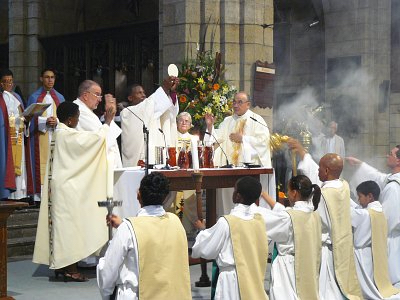Looking for the glimpse of glory
 Wednesday, November 4, 2020 at 6:22PM
Wednesday, November 4, 2020 at 6:22PM  The important way forward for all of us, in this time of so many overlapping worries, is to focus first on the things that we can control, and try to set aside those that we can’t. Mother Mariclair
The important way forward for all of us, in this time of so many overlapping worries, is to focus first on the things that we can control, and try to set aside those that we can’t. Mother Mariclair
On election day, after coffee and prayers I found myself laughing -- “Election day is finally upon us, and never has the nation felt so much like a Christian Scientist with appendicitis.” Bishop Peter Eaton started his reflection with that line. For me, it captured my own sense of anxiety and apprehension. Something that ran deeper than whether my candidate was going to win.
My inbox gathers a collection of political columns (left, center, and right), news sources, and diocesan and parish newsletters. Some days I read them; on other days I delete them. For the past few days I've made a point to at least skim. They are filled with advice for managing our fear and foreboding.
Take deep breaths. Be hopeful. Love and serve someone else.
I'm not making fun of them. It all helps. Yet, there's more. The more has to do with living in Reality.
It's no mistake that Henri Nouwen saw the counterpoint to illusion as prayer. Prayer and reality, God and Reality.
What we can influence
We don't need talk therapy we need cognitive therapy. We need to change our ways of thinking about control and influence. It's not a new idea for most of us. In fact, it may be so commonplace we don't see our own confusion.
God grant me the serenity
To accept the things I cannot change;
Courage to change the things I can;
And wisdom to know the difference.
Is not just for those in AA.
Circles of influence
This is a tool that's been around a long time. I recall making use of it as a T-Group trainer in the 70s. We'd ask people to reflect upon their assumptions and behavior in the group. They'd acknowledge their experiences of frustration, what they were concerned about, and what they had tried to accomplish in the group. They then were invited to be as realistic as they could be in analysing all that using the "Circles of Influence." Where in the group do you have no control or influence? What do you influence and what do you control? If you do a web search you'll find dozens of images and variations on the model. Stephen Covey used a similar model. Here's a video.
For today, I'll share the words of several people about coming to terms with our illusions about control; about sin and human limitation; about God and Reality.
Looking for the glimpse of glory
If we regard our lives from the perspective of faith, and of eternity, we are challenged to meet difficulties in a particular way. If we don't like something, and we are convinced in good conscience that we are right not to like it, we can either try to change it, or to change the way we think about it, looking for the glimpse of glory. Neither of those things may be easily done, but at least then we are actively engaging with our lives. What Harold Macmillan called 'events' may be beyond our control, but our conduct and our self-understanding is within our control. This isn't Pollyanna-ish or the philosophy of Candide; it is about the perspective of faith, which is surely what we seek to learn in Christian living. Michael Bowie, Newsletter Advent 1, All Saints Margaret Street
Focus first on the things that we can control, and try to set aside those that we can’t
The important way forward for all of us, in this time of so many overlapping worries, is to focus first on the things that we can control, and try to set aside those that we can’t. This has been my mantra throughout our time of Covid, and it has helped me tremendously when I manage it. This doesn’t diminish the importance of what our country is going through right now, nor does it minimize the weight of the outcome of this election on the civil rights and the lives of so many in our community- it simply anchors us in a place of empowerment, and shifts our perspective. Mariclair Partee Carlsen, Rector, St. Mary's Hamilton Village, Philadelphia.
For the life of God is undivided
The Church is never anxious at the changes and changes of this fleeting world, though as individual Christians we often are. It is not that the Church is unconcerned with human affairs, for the Church must be concerned with all this. What we mean is that, while the Church has one foot on earth, it has the other foot in heaven, and the vision of God is the balancing that we need especially in times of social unrest and national division. Here too is hope, for the life of God is undivided, full of the peace that passes all understanding, and it is this reality that the Church is called upon to live, whoever is the President, whatever else is going on in our political life. So today we participate, as good citizens should, but we participate with a deep assurance that God is all in all and our ultimate security, even on this election day, and not an individual or a party or a particular political system. Bishop Peter Eaton, Diocese of Southeast Florida
Escape finding oneself in the ranks of the insane
In the current chaos, I’ve come to appreciate Marcus Aurelius’s maxim that “The object of life is not to be on the side of the majority, but to escape finding oneself in the ranks of the insane.” Andrew Sullivan in a recent "The Weekly Dish"
Thy throne shall never pass away

Related
We no longer know what to do
Trust, listening, complete messages, and cooperation
Contemplation – Intercession – Action
The unfinished work
A list of all postings
"The day Thou gavest, Lord, is ended" was written by John Ellerton, 1826–1893. You can find it in the hymnals of many churches. It is the official evening hymn of the British Royal Navy and the Royal Australian Navy. The hymn was selected to be sung as part of the celebrations for the Diamond Jubilee of Queen Victoria in 1897 and was also sung at the Hong Kong handover ceremony a century later.
During the Second World War “The Day Thou Gavest” (sung here at a Commemoration office) was sung every Sunday by British prisoners of war held by Japan. The hymn was sung "to give them comfort and strength to carry on". In 1945 when Japan surrendered in Tokyo Bay “the ship’s band of HMS Duke of York, the British flagship, was joined by the massed bands from all the Royal Navy ships present and struck up a hymn as the flags of all the allied nations were lowered from the signal yards. The name of the hymn was “The Day Thou Gavest, Lord, is Ended.”
"The music inspired the Navy’s official historian, Admiral Morison, on board the Missouri, to pen this benediction to the American sailors, but also to all the American soldiers, airmen and Marines of the Second World War:
Nothing could have been more appropriate to the occasion than this Sunday evening hymn to the Author of peace and lover of concord. The familiar words and music, which floated over the now calm waters of the Bay to the American bluejackets, touched the mystic chords of memory and sentiment, reminding all hands of the faith that had sustained them through travail and sacrifice. It brought sailors back to base and made them feel their Navy had achieved something more than a military victory.